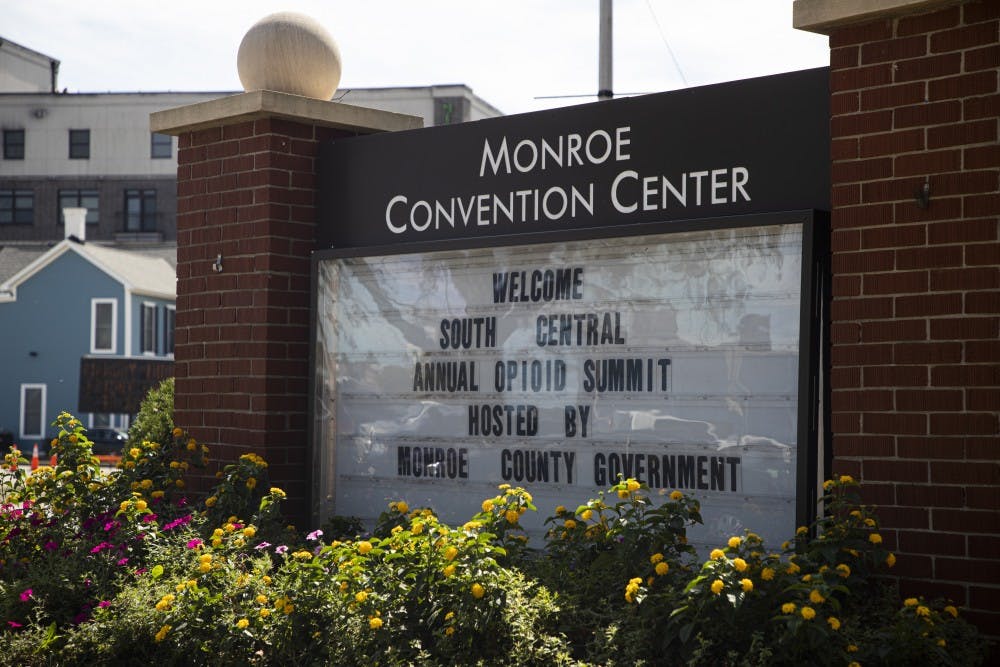President Donald Trump named the misuse and addiction to opioids a national crisis two years ago. In 2017, there were 47,600 overdose deaths according to the Centers for Disease Control and Prevention.
However, many of the speakers at the third annual South Central Opioid Summit expressed hope as numbers are gradually improving in Indiana.
People combating this problem in Monroe County and all over Indiana attended the summit Tuesday at the Monroe County Convention Center.
For the past two years the event has focused on the opioid epidemic as a whole, but this year the speakers shared information on integration and applying what is known about addiction to the legal system and the workplace.
Along with speakers and panels, there were breakout sessions that went more in-depth on various topics.
Alicia Suarez
Alicia Suarez, associate professor of sociology and chair of the department of sociology and anthropology at DePauw University, spoke about how important it is to approach the issue as a complex one that can’t be solved with solutions like abstinence or forced treatment.
“The opioid syndemic is a multilayer, systemic issue that requires complex and collaborative solutions,” she said.
She said harm reduction is important because it meets people where they are in their drug use.
“Recovery is not just sobriety,” she said.
Workforce Opportunities panel
Afterward was a panel discussion featuring local employers speaking about those in recovery gaining access to the workforce.
Erin Predmore, president and CEO of the Greater Bloomington Chamber of Commerce, moderated the panel, which featured Centerstone recovery specialist Tammy Hooten; Mike Thibideau, director of Indiana Workforce Recovery; Aimee Hawkins-Mungle, vice president of administrative services for Cook Group Inc. and Cook Medical; Chris Fredrickson, co-owner of Bloomington Tea; and Trellis Evans, director of Goodwill mission advancement: re-entry and disability services.
Hooten is in long-term recovery herself and said she believed being able to work was important to her staying sober.
“We have no confidence, no self-worth,” she said.
Being part of a team and having to be relied on helped build her self-esteem, Hooten said.
Regina LaBelle
Regina LaBelle, program director of the Addiction and Public Policy Initiative at the O’Neill Institute for National and Global Health Law, told the audience the issue needs to be tackled as a larger issue of addiction.
She also said she was hopeful Indiana is moving from the rescue phase of the crisis to the recovery phase.
“It’s too early to say we are out of the woods,” she said.
The Justice System panel
A key theme of the day was exploring the justice system's key role in the epidemic, both the ways it can help but also hinder recovery.
Sheriff Brad Swain; Judge Mary Diekhoff; Bloomington Police Department Chief Mike Diekhoff; Louis Malone, deputy director of Youth Service Bureau; and Kassandra Botts with the Indiana Recovery Alliance spoke about their sequential roles in dealing with addiction.
“Everyone matters,” Malone said. “All of us together, we will build a better community.”
The Indiana Recovery Alliance strives toward harm reduction by providing clean needles, education, disease testing and training on the use of naloxone, an overdose reversal drug, Botts said.
While it is still an Indiana felony to possess a syringe, many on the panel agreed this was something they hope will be changed.
Swain said he would be open to learning more about providing naloxone kits to those just getting out of jail because they are a group often affected by overdosing.
Mike Diekhoff said every BPD officer carries a kit on them.
Monroe County’s court system has a drug treatment court which works to help drug offenders recover.
Some other courts don’t allow treatments such as prescriptions that help with the withdrawal effects, but Monroe County does.
Mary Diekhoff said she used to be against this, but sees the positive benefits now.
“I’m for anything that will help people get off drugs,” Mary Diekhoff said. “Everyone’s goal here is to keep people alive. Addiction’s goal is to kill you.”
Keynote speaker Loretta Rush
Loretta Rush, Chief Justice of the Indiana Supreme Court and co-chair of the National Judicial Opioid Task Force, was the final speaker at the conference. She shared helpful resources for judges and others on the best methods of dealing with opioid use in the court system.
“What we need to do in the judicial branch is set up a model for dealing with addiction, whatever that next one is,” she said.
“We knew how to be tough on drugs,” she said. “Now we need to be smart.”
She said this means dealing with drug addiction as a disease, talking about it differently, treating people differently and getting rid of the stigma.
“We cannot hide from the numbers that show the depth of the addiction problem in our state,” Rush said. “We must face them with courage and consider the humanity behind the numbers.”




